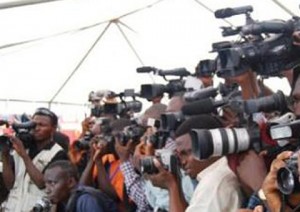Ghana drops three spots to rank 30 on 2020 World Press Freedom Index
 Ghana has for a long time been seen as a beacon of democracy and press freedom in a conflict-ridden West Africa. But there have been growing concerns for good governance and freedom of journalists to do their work. For a while now, the country has been sliding on the press freedom index.
Ghana has for a long time been seen as a beacon of democracy and press freedom in a conflict-ridden West Africa. But there have been growing concerns for good governance and freedom of journalists to do their work. For a while now, the country has been sliding on the press freedom index.
The country has dropped three points to rank at 30 on the 2020 World Press Freedom Index released today, April 21, 2020 by the Reporters Without Borders (RSF).
The country ranked at 27 on the 2019 Index, a drop of four points from the rank of 23 from the previous year.
“Although Ghana continues to be seen as one of the most democratic countries in Africa and Chapter 12 of its 1992 constitution guarantees media pluralism and independence, a third of the media are owned by the state or by businessmen linked to the government. A group of investigative journalists had to spend part of 2018 in hiding after producing a documentary about Ghanaian soccer corruption. A ruling party parliamentarian who had been named in the documentary publicly threatened one of the journalists without ever being arrested or questioned. The journalist was shot dead in the street a few months later,” the publishers said, among others.
The World Press Freedom Index published every year by Reporters Without Borders ranks 180 countries and regions according to the level of freedom available to journalists.
According to the publishers, the 2020 Index, shows that the coming decade will be decisive for the future of journalism, with the COVID-19 pandemic highlighting and amplifying the many crises that threaten the right to freely report, independent, diverse and reliable information.
RSF, notes that the 2020 edition of the Index, which evaluates the situation for journalists each year in 180 countries and territories, suggests that the next ten years will be pivotal for press freedom because of converging crises affecting the future of journalism: a geopolitical crisis (due to the aggressiveness of authoritarian regimes); a technological crisis (due to a lack of democratic guarantees); a democratic crisis (due to polarisation and repressive policies); a crisis of trust (due to suspicion and even hatred of the media); and an economic crisis (impoverishing quality journalism).
These five areas of crisis – the effects of which the Index’s methodology allows RSF to evaluate – are now compounded by a global public health crisis, the group stated.
Commenting, Christophe Deloire, the RSF Secretary-General said: “We are entering a decisive decade for journalism linked to crises that affect its future.
“The coronavirus pandemic illustrates the negative factors threatening the right to reliable information, and is itself an exacerbating factor. What will freedom of information, pluralism and reliability look like in 2030? The answer to that question is being determined today,” he said.
RSF argues that there is a clear correlation between suppression of media freedom in response to the coronavirus pandemic, and a country’s ranking in the Index.
The report noted that both China (177th) and Iran (down 3 at 173rd) censored their major coronavirus outbreaks extensively. In Iraq (down 6 at 162nd), the authorities stripped Reuters of its licence for three months after it published a story questioning official coronavirus figures. Even in Europe, Prime Minister Viktor Orbán of Hungary (down 2 at 89th), had a “coronavirus” law passed with penalties of up to five years in prison for false information, a completely disproportionate and coercive measure.
“The public health crisis provides authoritarian governments with an opportunity to implement the notorious “shock doctrine” – to take advantage of the fact that politics are on hold, the public is stunned and protests are out of the question, in order to impose measures that would be impossible in normal times,” Deloire said, adding, “For this decisive decade to not be a disastrous one, people of goodwill, whoever they are, must campaign for journalists to be able to fulfil their role as society’s trusted third parties, which means they must have the capacity to do so.”
By Emmanuel K. Dogbevi
